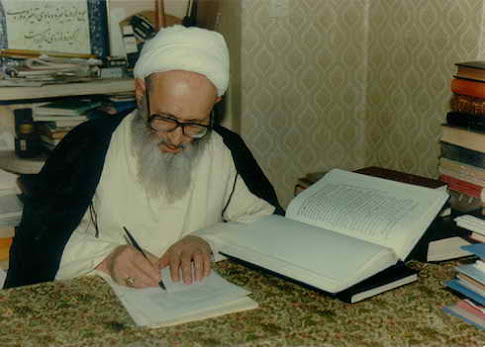SELF-APPRAISAL (MUHAASABE) [1]
Imam al-Kazim (‘a) says: Whosoever does not appraise his actions daily, is not from us. That is, he should evaluate and see that if he has done a good deed, he should ask more of the same from Allah, and if he has done any sin, he should seek forgiveness from Allah and return to Him in penitence. [2]
Marhum Hasan bin Fadhl al-Tabrasi narrates that the Prophet (s) amidst his counsels to Abu Dharr, said:
O Aba Dharr, a human being would not be among the God-wary (muttaqin) until he appraises himself every day with greater [scrutiny and] accuracy than [one] appraising his financial partner, and he knows where his food has come from, the source of his drink, and from where has he procured his dress; He should know whether they are from lawful or unlawful means. [3]
NARRATION OF PRESENCE
15. From Self-Appraisal to Spiritual Victories
Hadhrat Ustaad (perpetual be his esteem) had extreme attention to self-appraisal and he would [also] emphasize the same. One day, in the gathering of his lesson, he said:
O dear ones, assess yourselves, so that you may be an example of “…such shall enter Paradise, provided therein, without any reckoning” (yadkhuluna al-Jannata yurzaqoona fiha bighayri hisaab). [4] Seek forgiveness from evil deeds, and express praise for your good actions, for self-appraisal (muhaasabe) brings about self-caution (muraaqabe), which in turn reaps [spiritual] presence, and presence reaps [spiritual] victories (futooh)!
16. The Last Advice of ‘Allama al-Tabataba’i
Ayatullah Haaj Sayyid Muhammad Hasan Murtadhawi Langrudi, the son of Marhum Ayatullah Haaj Sayyid Murtadha Murtadhawi Langroodi would attend the lessons of ‘Allama Tabataba’i on the Asfaar [of Mulla Sadra], the Shifaa of Avicenna, as well as the class of Qur’anic exegesis. He also attended the private lessons on Thursday and Friday nights which would be held in one of the houses of the attendants. In one of his speeches he says:
‘Allama Tabataba’i was among the people of self-caution (muraaqabe). Once we came in his presence so tha
 t he may give us an instruction to follow. He said: The spiritual wayfarer must from the start until the end of spiritual wayfaring adhere to the two states of self-caution (muraaqabe) and self-appraisal (muhaasabe). He said: At the end of the night, before sleeping, analyze the actions that you have performed during the day. For whatever good action you had performed, praise and thank God, and ask Him to bestow you with succor to perform the action even better the next day. And if God forbid, you had done something wrong or committed a mistake, repent immediately, and resolve not to perform it again. If you observe that you have performed a number of bad deeds, make a decision to lessen them the next day. In short, he said that the states of self-caution (muraaqabe) and self-appraisal (muhaasabe) must always be there. Lately also, when he (‘Allama Tabataba’i) could not speak properly, a friend asked him for counsels, and he once again said, “Self-caution (muraaqabe), and self-appraisal (muhaasabe)!” [5]
t he may give us an instruction to follow. He said: The spiritual wayfarer must from the start until the end of spiritual wayfaring adhere to the two states of self-caution (muraaqabe) and self-appraisal (muhaasabe). He said: At the end of the night, before sleeping, analyze the actions that you have performed during the day. For whatever good action you had performed, praise and thank God, and ask Him to bestow you with succor to perform the action even better the next day. And if God forbid, you had done something wrong or committed a mistake, repent immediately, and resolve not to perform it again. If you observe that you have performed a number of bad deeds, make a decision to lessen them the next day. In short, he said that the states of self-caution (muraaqabe) and self-appraisal (muhaasabe) must always be there. Lately also, when he (‘Allama Tabataba’i) could not speak properly, a friend asked him for counsels, and he once again said, “Self-caution (muraaqabe), and self-appraisal (muhaasabe)!” [5]To be continued soon Insha Allah...





